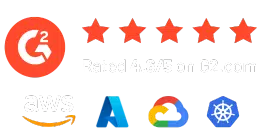What is FinOps-as-a-Service?
FinOps as a Service, or 'FaaS' for short, merges the principles of financial operations (FinOps) with cloud computing to optimize cloud spend and improve financial accountability.
With cloud expenditure continuing to soar, organizations are struggling to keep track of costs, leading to budget overruns and inefficient resource use.
FaaS is a strategic approach that aligns cloud investment with business outcomes, ensuring every dollar spent on the cloud is tracked, optimized, and justified.
FinOps-as-a-Service is the outsourced management & optimization of your cloud spending using advanced analytical tools, automation, and expert insight.
How FinOps-as-a-Service Works
FaaS acts as a specialized extension to manage your cloud spending efficiently.
FaaS providers integrate seamlessly with your cloud providers and financial systems, delivering a comprehensive breakdown of expenditures.
By leveraging third-party tools (including automation and AI), FaaS providers identify cost-saving opportunities, automatically adjust resources, and predict future usage patterns to optimize cost and performance.
This outsourced expertise lets you focus on core activities while benefiting from advanced cost management and strategic insights.
The name of the game is maximizing your cloud ROI without expanding internal teams.
🤓 What's the FinOps Framework? Find out in our guide to FinOps.
The Core Components of FinOps-as-a-Service
Best-in-class FaaS encompasses a few key components:
- Unit Economics Analysis: Review and track cost and revenue per measurable resource, e.g. compute or storage, highlighting the financial impact of each unit on overall profitability.
- Financial Planning & Analysis (FP&A) for the Cloud: Tailoring budgeting and forecasting methods to accommodate the cloud's increasingly variable costs.
- Real-time Cost Monitoring & Optimization: Employing tools and practices to monitor and adjust cloud spending in real time.
- Allocation & Chargeback Models: Implementing methodologies to accurately distribute cloud costs across departments, ultimately promoting accountability.
Why use a FaaS Provider?
FaaS offers a multitude of benefits, and can quickly pay for itself in savings alone. By leveraging a third party's experience of FinOps principles and practices, you will achieve greater financial transparency, efficiency, and agility.
Enhanced Cost Visibility & Accountability
Granular Spending Insights: FaaS use tools and platforms to offer detailed visibility into cloud costs, breaking down expenses by service, department, project, or even individual resource. This granular insight allows organizations to understand precisely where and how their cloud budget is being spent.
Cultural Shift Towards Cost Awareness: Implementing FaaS fosters a culture of cost transparency and accountability, encouraging teams across the organization to take ownership of their cloud usage and costs. This cultural shift is pivotal in ensuring that cloud spending aligns with business objectives and outcomes.
Improved Cloud Budgeting & Forecasting
Accurate and Adaptive Budgeting: With FaaS, budgeting for cloud expenses becomes more accurate and adaptive to changing business needs. FaaS provides the tools and data necessary for finance and IT teams to forecast cloud spending with a higher degree of precision, taking into account seasonal fluctuations, project timelines, and business growth.
Proactive Cost Management: By enabling real-time monitoring and reporting of cloud costs, FaaS providers identify budget overruns early and adjust spending or usage before costs spiral out of control. This proactive approach to cost management helps avoid surprises at the end of the billing cycle.
Cost Optimization & Savings
Identifying and Eliminating Waste: FaaS providers utilize advanced analytics and machine learning algorithms to identify underutilized or unnecessary resources, enabling organizations to eliminate waste and reduce costs without impacting performance or availability.
Resource Optimization: Beyond cutting costs, FaaS enables smarter resource allocation- ensuring that resources are optimally sized and allocated according to need. This optimization can lead to significant savings and more efficient cloud resource utilization.
Negotiation Leverage: Armed with detailed usage data and spending trends, FaaS providers can use insights to negotiate more favorable terms with cloud service providers.
Enhanced Decision-Making & Strategic Planning
Data-driven Decisions: With comprehensive insights into cloud spending and usage patterns, decision-makers can make better-informed strategic decisions about cloud investments, scaling, and cost management strategies. The result is cloud services that are more closely aligned to business objectives.
Long-term Financial Planning: FaaS providers' insights facilitate more accurate long-term cloud spending, facilitating strategic financial planning and investment in innovation.
Streamlined Operations & Increased Agility
Automated Cost Management: FaaS providers normally use automation tools for cost management, including budget alerts, automating resource scaling based on usage, and implementing policy-driven governance. This reduces manual overhead and risk while increasing operational efficiency.
Enhanced Business Agility: By optimizing cloud costs and ensuring efficient resource use, FaaS helps businesses become more agile. Organizations can scale resources up or down in response to market demands without being hindered by financial constraints or inefficiencies.
How to Choose a FinOps-as-a-Service Provider
- Compatibility with Your Cloud Infrastructure: Ensure the FaaS provider supports all the cloud platforms you use (e.g., AWS, Azure, GovCloud). The provider should offer deep integrations with these platforms to extract detailed usage and cost data.
- Comprehensive Cost Management Tools & Knowledge: Look for a provider that offers a wide range of cost management tools, including cost allocation, budgeting, forecasting, and optimization recommendations. The ability to set up custom alerts and reports is vital to track real-time spending.
- Automation & Optimization Capabilities: The best FaaS providers leverage automation for cost optimization, such as automatically resizing instances or shutting down unused resources.
- Security & Compliance: Ensure the provider meets high security standards, and complies with relevant regulations (e.g., GDPR, HIPAA). Data privacy and protection should be a top priority. Government clearance may also be a requirement, depending on the nature of your organization.
- Experience & Expertise: Look for providers with a proven track record and expertise in your industry or with companies of similar size and cloud complexity. Case studies and references can provide insights into their success stories. Bonus points for Certified Finops Professionals, too.
🎧 Treat your ears to our list of the best FinOps podcasts
Types of Companies Offering FaaS
Three types of organization have started to offer FinOps-as-a-Service:
- Consultancies & Professional Services: A growing number of firms specialize in cloud financial management, FinOps consulting, and ongoing FaaS. Companies like Better Than Services, a Hyperglance partner, offer advisory services, implementation support, and ongoing FaaS management. These services can normally be tailored to your needs, providing expertise to help you establish and refine your FinOps practices - or outsource them completely!
- Managed Service Providers (MSPs): MSPs may offer FinOps as part of their broader cloud management services. They can manage your cloud expenses, and take care of optimization efforts on your behalf. If you're after a completely hands-off approach, this might be the option for you.
- Independent Software Vendors (ISVs): In rare cases, cloud cost optimization software companies have an internal team (or partner) that allows them to offer FinOps-as-a-Service.
When selecting a FaaS provider, be sure to conduct thorough research, request a few demos, and evaluate each provider against your specific requirements and cloud strategy.
The right provider is more than a tool provider, they should be your partner in your FinOps journey, helping you to maximize the value of your cloud investments.
🧠 Need to brush up on your jargon? Head over to our FinOps glossary.
Conclusion
As cloud tech evolves, so will FaaS, incorporating more advanced AI and machine learning (ML) capabilities for predictive cost management and optimization.
The growing emphasis on sustainability and cost efficiency in cloud computing will further drive the adoption of FaaS (and the adoption of internal FinOps teams).
Always engage a FaaS provider that aligns with your cloud strategy and business goals to begin realizing the benefits of optimized cloud spending.
Best-in-Class Tools for FinOps, Architects & Engineers
Hyperglance is rapidly becoming the preferred cost optimization tool of FinOps, GreenOps and Cloud professionals worldwide.
Open your eyes to a world of detailed analytics, actionable insights, codeless automation, billing reports, trend analysis, and anomaly detection.
The only thing dropping as fast as your cloud costs will be your stress level.
Why Choose Hyperglance?
- From RI recommendations to right-sizing and orphaned resources, Hyperglance ships with a best-in-class cost-optimization rules engine and billing reports.
- Layer your AWS, Azure & GCP costs over intuitive, interactive exportable diagrams and customizable dashboards. Find problem resources using powerful filtering and grouping.
- Access deep analytical views of cloud usage, enabling rapid resource optimization, anomaly detection & alerting, proactive cost management, and laser-accurate forecasting.
- Cost optimization is just the start. Use Hyperglance to explore enlightening real-time inventory diagrams, identify and fix security issues, and automate jobs.


About The Author: Stephen Lucas
As Hyperglance's Chief Product Officer, Stephen is responsible for the Hyperglance product roadmap. Stephen has over 20 years of experience in product management, project management, and cloud strategy across various industries.
